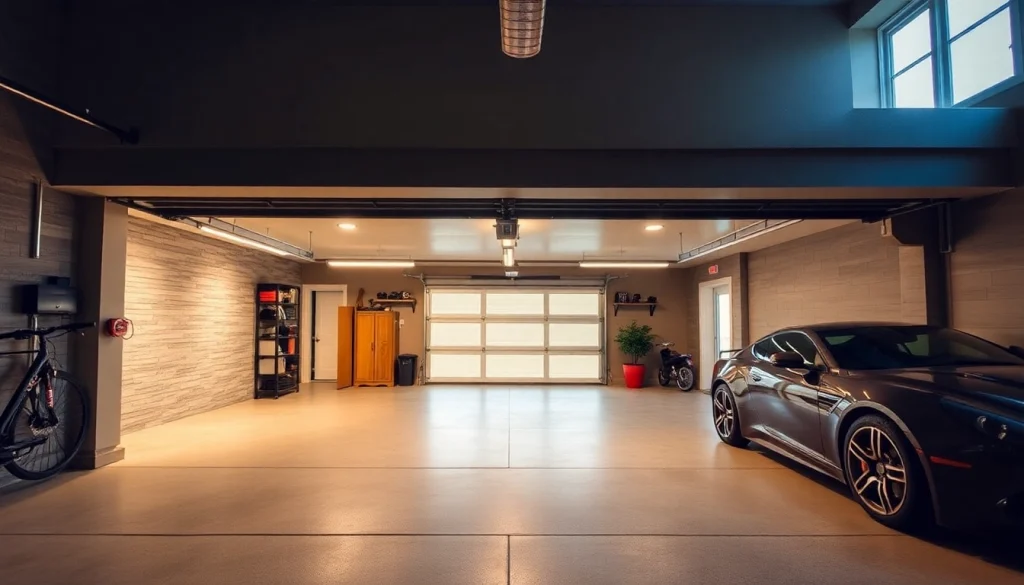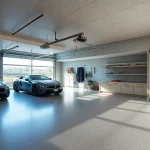Understanding Custom Garages
When envisioning a perfect home, the garage is often an overlooked element. Many people associate garages simply with housing vehicles or storage, but the reality is that custom garages offer much more than that. They can enhance property value, optimize space, and meet a variety of personal needs. In this comprehensive guide, we’ll delve into the world of custom garages, exploring their definitions, benefits, types, design considerations, and practical solutions for maximizing their potential.
What Are Custom Garages?
Custom garages are personalized spaces designed and built to meet the specific needs of the homeowner. Unlike standard garages, which come in fixed sizes and minimal designs, custom garages allow homeowners to dictate everything from dimensions and layout to style and materials. This degree of personalization ensures that the space serves its intended purpose effectively, whether it be for parking vehicles, creating a workshop, establishing a storage area, or even serving as a recreational space.
Benefits of Custom Garages
The benefits of custom garages are numerous:
- Increased Property Value: A custom garage can significantly increase the overall value of your property. Potential buyers often see tailored features as added bonuses, making your home more attractive on the market.
- Personalization: Homeowners can choose every aspect of their garage to suit their tastes and requirements, from the style and color to the layout and internal features.
- Enhanced Functionality: Custom garage designs can incorporate specialized storage solutions, workspaces, or recreational features that a standard garage simply cannot accommodate.
- Space Optimization: With the right design, a custom garage can maximize a property’s available space, allowing for more efficient use of the area.
- Protective Features: Many custom garages can be designed with security features, insulation, and weather protection that standard garages lack, leading to better protection for vehicles and stored goods.
Different Types of Custom Garages
When considering a custom garage, several types may align with your needs:
- Detached Garages: These are stand-alone structures separate from the main house. They provide added privacy and can be built to larger capacities, making them ideal for extra vehicles or storage.
- Attached Garages: These garages are directly connected to your home, providing convenient access. They can be integrated into the home’s design, offering aesthetic cohesion.
- Workshops: For hobbyists or DIY enthusiasts, a custom garage can function as a workshop, complete with benches, tools, and workspaces designed for specific projects.
- Luxury Garages: Homeowners looking for high-end features can opt for luxury garages that include amenities like climate control, premium finishes, and sophisticated storage solutions.
- Multi-Car Garages: If you have more than one vehicle or plan to accommodate guests, multi-car garages are spacious custom designs that allow for multiple automobiles and equipment storage.
Designing Your Custom Garage
Turning your vision for a custom garage into reality requires thoughtful design and planning. Understanding key features, material choices, and functionalities is essential for crafting a space that meets all your needs.
Key Features to Consider
There are several essential features that can enhance your custom garage’s functionality and appeal:
- Size and Dimensions: The garage should accommodate your vehicles comfortably while leaving space for movement. Consider future needs, such as additional vehicles or storage options.
- Doors: Choosing the right garage door is crucial. Options include traditional swing-out doors, sliding doors, or contemporary overhead garage doors, each offering unique advantages.
- Windows: Natural light can make a garage feel more inviting. Consider including windows or skylights to brighten the space and offer ventilation.
- Flooring: Selecting durable and easy-to-clean flooring you can invest in can greatly improve the look and longevity of your garage. Options range from epoxy coatings to concrete and tiles.
- Insulation: Good insulation can keep the garage temperature regulated, protecting vehicles and belongings from extreme weather conditions.
Choosing Materials and Finishes
The materials and finishes you select for your custom garage not only determine its appearance but also its durability and maintenance needs:
- Exterior Materials: This includes wood, vinyl siding, metal, or brick, each offering distinct aesthetics and durability.
- Roofing: The choice of roofing materials—shingles, metal, or tiles—should complement the home’s design while offering longevity and protection.
- Interior Finishes: Consider painted drywall, storage solutions, and cabinetry that are both functional and appealing to create a cohesive look.
Incorporating Functional Options
To maximize the utility of your custom garage, incorporate functional options that can transform the space:
- Storage Solutions: Integrate shelves, overhead racks, and cabinets to keep the garage organized and free of clutter.
- Electrical Outlets: Ensure sufficient electrical outlets for charging electric vehicles, using tools, and other equipment.
- Heating and Cooling: Depending on your climate, consider adding heating and cooling solutions to enhance comfort.
- Workstations: If your garage doubles as a workshop, a designated area for tools and projects will be invaluable.
Planning and Budgeting for Custom Garages
To successfully navigate the creation of your custom garage, effective planning and budgeting are critical. Understanding costs and working with the right professionals can help realize your vision without overspending.
Estimating Costs
The cost of building a custom garage can vary widely based on several factors:
- Location: Construction costs can differ based on your location, local labor rates, and materials availability.
- Size: Larger garages require more materials and labor, directly impacting overall costs.
- Customization: Higher levels of customization, such as specialized features or high-end finishes, will increase your budget.
- Land Preparation: If the site requires significant preparation, such as leveling or clearing, this will add to your expenses.
It is advisable to obtain multiple quotes from builders to get a clearer idea of your cost expectations.
Finding the Right Builder
Selecting the right contractor to build your custom garage is an essential step in the process:
- Research: Look for builders who specialize in custom constructions and have a strong portfolio. Ask for references and read reviews.
- Consultation: Schedule meetings with potential builders to discuss your ideas and gauge their understanding of your vision.
- Communication: Choose a builder who communicates clearly and is willing to accommodate your preferences and needs throughout the project.
Securing Permits and Approvals
Before beginning any construction, ensure that you have obtained the necessary building permits:
- Check Local Regulations: Different municipalities have varying regulations regarding construction, so verify what is required for your area.
- Application Process: Familiarize yourself with the permitting process, which usually involves submitting plans and fees.
- Compliance: Ensure that your garage will comply with local zoning regulations and building codes to avoid any legal issues.
Maximizing Space in Custom Garages
Efficient space usage is vital in guaranteeing that your custom garage meets your needs without feeling cluttered or cramped. With effective storage solutions and design strategies, you can maximize the utility of the space available.
Storage Solutions
Employing creative storage solutions can vastly improve the organization and functionality of your garage:
- Vertical Storage: Install shelving units or cabinets that utilize wall spaces to keep items organized and off the ground.
- Overhead Bins: Use ceiling-mounted storage systems for seasonal items, effectively utilizing often wasted space.
- Custom Cabinets: Built-in cabinetry can create tailored storage for tools, gardening equipment, and sporting gear, keeping everything easily accessible.
Design Tips for Small Spaces
For those working with limited square footage, simple design adjustments can create a more open and functional environment:
- Light Colors: Light paint colors can make a small garage feel more spacious.
- Open Layout: Avoid clutter by reducing the number of unnecessary items and opting for an open layout.
- Mirrors: Adding mirrors can also help enhance the feeling of openness and light.
Enhancing Accessibility and Functionality
To ensure that your custom garage is functional, focus on design elements that enhance accessibility:
- Wide Pathways: Ensure that there is enough room for movement around vehicles and equipment.
- Convenient Location: Consider the location of tools, storage, and workspaces to minimize unnecessary walking.
- Lighting: Adequate lighting is essential for safety and functionality. Incorporate both natural and artificial lighting solutions.
Showcasing Your Custom Garage
A custom garage isn’t just a functional space; it can become a highlight of your property when designed thoughtfully. By focusing on aesthetics and maintenance, you can create an appealing area that complements your home.
Creating Curb Appeal
Enhancing your garage’s exterior can contribute to the overall charm of your property:
- Architectural Style: Align the design of your garage with the architectural style of your home for a cohesive look.
- Landscaping: Incorporate landscaping elements like plants, hedges, or decorative rocks that frame the garage.
- Color Coordination: Choose paint and materials that complement the overall color palette of your property.
Lighting and Decor Ideas
Lighting is key to creating an inviting atmosphere inside your garage:
- Task Lighting: Adequate task lighting in workspaces enhances functionality while providing safety.
- Ambient Lighting: Use soft ambient lighting to create a warm and inviting feeling when entering the space.
- Decor Elements: Personalized decorations such as wall art, pegboards for tools, or decorative storage options can reflect your personality and hobbies.
Maintaining Your Custom Garage
Regular maintenance is crucial to keeping your custom garage in pristine condition:
- Regular Cleaning: Schedule periodic cleaning to prevent dust and clutter accumulation.
- Inspecting & Repair: Regularly check for any wear and tear, ensuring that doors, windows, and flooring remain functional and visually appealing.
- Organizational Systems: Maintain organizational systems so that tools and items remain easily accessible and properly stored.


